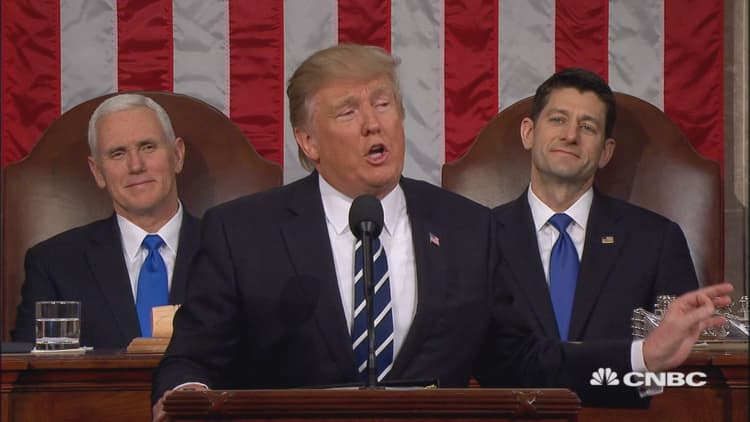As lawmakers continue to debate how to repeal Obamacare, investors would be remiss to ignore the one thing most Republicans can agree on about health care: health savings accounts.
HSAs, introduced in 2003, offer you triple tax advantages: First, contributions are tax-deductible. Second, those contributions can be invested and grow tax-free. Third, withdrawals aren't taxed as long as you use them for qualified medical expenses, such as doctor's visits, prescription drugs and dental care.
"HSAs are favored by Washington at the moment," said Eric Dowley, head of Fidelity Investments' HSA business.
Dowley said he thinks Congress could eventually raise HSA contribution limits, either as part of tax or health-care reform. In 2017, you (and your employer) can contribute up to $3,400 to an HSA for individuals and $6,750 for families. Account holders age 55 and older can contribute an extra $1,000.
HSAs are favored by Washington at the moment.Eric DowleyFidelity Investments
Unlike with flexible spending accounts, where you have to use most of your tax-deferred money each year or you lose it, people with HSAs can invest their money after they reach a certain threshold. The typical minimum investment level is $1,000, but it depends on your HSA provider.
A triple-tax-advantaged investment account doesn't come free. HSAs must be paired with a high-deductible health plan. That means you'll have to pay a deductible of at least $1,300 for individual coverage and $2,600 for families in plans this year. The maximum annual out-of-pocket costs for these plans are $6,550 for individuals and $13,100 for families.
More from Your Money Your Future:
Here are the top 10 cities for early retirees
This year's hot tax trend ... saving not splurging
Warren Buffett's advice 'doesn't work anymore,' robo-advisor CEO says
Provisions of the failed American Health Care Act would have nearly doubled the contribution limits for HSAs to match the annual deductible and out-of-pocket expenses under a high-deductible health plan.
Even without the higher contributions limits, health savings accounts grew to an estimated $37 billion in assets and 20 million accounts at the end of last year and reached $41 billion in assets during January, according to Devenir, an HSA consulting firm in Minneapolis.
Given the momentum, Devenir forecasts assets in the accounts could reach more than $53 billion by 2018, a 20 percent increase from 2017. (See chart below.)
Roughly three-quarters of people who have HSAs withdraw less than they contribute. People who invest their HSA money in stocks and bonds have an average balance of $14,000 compared with $2,500 for those who keep it 100 percent in cash, according to new research from Fidelity Investments based on data from the accounts it administers.
"An HSA is an ideal vehicle to fund retiree medical expenses," said Chris Byrd, executive vice president at WEX Health, a payments technology company that administers benefits for more than 225,000 employers.
Health costs in retirement can seem daunting. Fidelity estimates that a 65-year-old couple retiring in 2016 would need roughly $260,000 to cover health-care costs during retirement. Sounds like a daunting number. But keep in mind that is over all your retirement. So if you have 22 years of retirement, that's roughly $985 per month. It is still a high number, but not insurmountable.
How should people invest their HSA money? "It's going to be a different case for everyone," Dowley said. Generally, you should have enough cash in your HSA to cover expected medical expenses and invest the rest.
Here are some portfolio guidelines Fidelity uses based on age:
You may not have robust investing options in your current HSA. "There is a lack of standardization in the marketplace," said Shelby George, senior vice president of advisor services at Manning & Napier.
Your employer may direct you to sign up with its preferred HSA provider, although if you are enrolled in a qualified high-deductible health plan, you can choose whatever provider you want. However, if employers only offer matching HSA contributions to their preferred provider, it makes sense to stick with them.
HSAs can travel with you if you change jobs or insurers. Use HSASearch, which is run by Devenir, to comparison shop for more than 320 providers. Just like with any retirement account, fees and investment options matter.

The end of the American Health Care Act did not diminish the prospects of HSAs. You will likely hear more about them in the future.
"Keep in mind that there is a lot of health care in tax reform, including HSAs, and so if attention turns in that direction, there will be opportunities to reprise the proposals favoring HSAs," Byrd said.
Correction: Devenir forecasts assets in HSA accounts could reach more than $53 billion by 2018, a 20 percent increase from 2017. An earlier version misstated the percentage.






